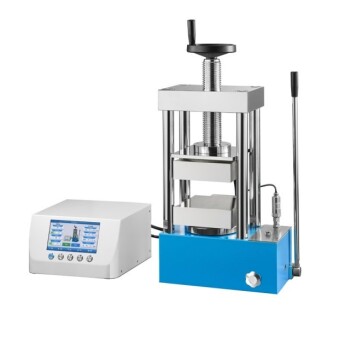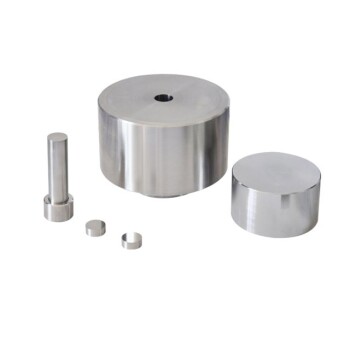In essence, a hydraulic press ensures repeatability and reliability by transforming force application from a variable into a constant. It achieves this through the precise control and consistent delivery of pressure, which is critical in research and quality control settings where test conditions must be identical from one sample to the next. This capability eliminates guesswork and user-to-user variability, ensuring that any observed differences are due to the material being tested, not the test itself.
The true value of a hydraulic press in a testing environment is its ability to remove uncertainty. By providing a verifiable and repeatable force, it allows you to trust that your results are a true reflection of your material's properties, not an artifact of an inconsistent testing method.

The Core Principle: Isolating Variables with Controlled Force
The fundamental goal of any scientific test is to isolate and measure the effect of a single variable. Hydraulic presses are designed to make applied force a controlled constant, thereby increasing the reliability of your entire testing protocol.
How Consistent Pressure is Achieved
A hydraulic system operates on Pascal's principle, where pressure exerted on a confined fluid is transmitted equally in all directions. This results in an exceptionally smooth and uniform application of force, free from the jerky, uneven pressure that can occur with manual or less precise mechanical methods.
This consistency is the bedrock of repeatable testing. It guarantees that every sample is subjected to the exact same compressive load, in the exact same manner.
The Role of the Pressure Gauge
The inclusion of a pressure gauge is what makes this consistency verifiable and repeatable. The gauge provides direct, quantitative feedback, allowing the operator to apply a precise amount of force and, critically, to replicate that exact force for every subsequent test.
Without a gauge, repeatability would rely on an operator's "feel," introducing significant human error. The gauge transforms this subjective action into an objective, data-driven process.
Simulating Real-World Conditions
Reliability isn't just about repeating the same test; it's about accurately modeling a specific condition. Hydraulic presses allow researchers to simulate the extreme pressures a material might face in its intended application.
This could be the immense load on a concrete support column in a skyscraper or the conditions required to form advanced superalloys for aerospace components. The ability to reliably create these conditions in the lab is crucial for innovation and safety.
Key Applications Driven by Repeatability
The reliability offered by hydraulic presses makes them indispensable across various fields, from fundamental research to industrial quality control.
Material Property Testing
When investigating mechanical properties like strength, hardness, elasticity, or fracture points, the press provides the stable baseline. By applying a controlled force, researchers can confidently measure how a material responds.
Because the force is repeatable, any difference in performance between Sample A and Sample B can be attributed to the materials themselves, not to a variation in the test conditions.
Industrial Quality Control
In manufacturing, hydraulic presses are used to verify that products meet specifications. For example, they test the tensile strength of cured concrete to ensure it meets building standards or assess the "blocking resistance" of printed materials to see how they behave under pressure during stacking and shipping.
Here, the press provides a simple, repeatable pass/fail test, ensuring every batch meets the required quality standard.
Uniform Sample Preparation
In analytical chemistry, sample preparation is often the largest source of error. For techniques like Fourier-transform infrared (FTIR) spectroscopy, the material is often ground into a powder and pressed into a uniform pellet.
A hydraulic press ensures each pellet has the same density and thickness. This consistency is vital for generating a reliable and accurate analytical signal, as it removes sample preparation as a potential variable in the results.
Understanding the Trade-offs and Limitations
While highly effective, a hydraulic press is a tool whose reliability depends on its proper use and maintenance.
The Need for Calibration
A pressure gauge is only as trustworthy as its last calibration. Regular calibration against a known standard is non-negotiable. An uncalibrated press provides a false sense of precision, creating consistent but inaccurate results.
The Importance of a Standardized Procedure
The press controls the force, but the operator controls the process. For true repeatability, the entire procedure—including how long pressure is applied and the rate of pressure release—must be standardized and documented.
Not a Universal Solution
Hydraulic presses excel at applying static compressive and tensile forces. They are not the appropriate tool for all types of material testing, such as dynamic impact tests or high-cycle fatigue tests, which require specialized machinery.
Making the Right Choice for Your Goal
To maximize reliability, integrate the hydraulic press into a fully standardized testing protocol.
- If your primary focus is Quality Control: Use the press to establish a strict, repeatable force and duration standard for pass/fail decisions on every batch.
- If your primary focus is Research & Development: Leverage the press to systematically and precisely vary pressure, allowing you to reliably isolate its effect on material behavior.
- If your primary focus is Analytical Sample Prep: Standardize your entire pressing procedure—force, duration, and release—to eliminate the sample itself as a source of experimental error.
Ultimately, a hydraulic press provides the confidence that your test results reflect the properties of your material, not the inconsistencies of your method.
Summary Table:
| Aspect | Contribution to Repeatability & Reliability |
|---|---|
| Force Control | Provides consistent, uniform pressure via hydraulic principles, eliminating variability. |
| Pressure Gauge | Enables verifiable, repeatable force application with quantitative feedback. |
| Applications | Supports material testing, quality control, and sample prep with identical conditions. |
| Limitations | Requires calibration and standardized procedures for optimal reliability. |
Enhance your laboratory's testing accuracy with KINTEK's reliable hydraulic presses! Specializing in automatic lab presses, isostatic presses, and heated lab presses, we deliver precise force control for repeatable results in material testing, quality assurance, and sample preparation. Trust our expertise to eliminate variability and boost your research efficiency. Contact us today to discuss how our solutions can meet your specific lab needs!
Visual Guide

Related Products
- Laboratory Hydraulic Press 2T Lab Pellet Press for KBR FTIR
- Automatic Laboratory Hydraulic Press Lab Pellet Press Machine
- Laboratory Hydraulic Press Lab Pellet Press Button Battery Press
- Manual Heated Hydraulic Lab Press with Integrated Hot Plates Hydraulic Press Machine
- Automatic Laboratory Hydraulic Press for XRF and KBR Pellet Pressing
People Also Ask
- What are some laboratory applications of hydraulic presses? Boost Precision in Sample Prep and Testing
- Why is sample uniformity critical when using a laboratory hydraulic press for humic acid KBr pellets? Achieve FTIR Accuracy
- How are hydraulic presses used in spectroscopy and compositional determination? Enhance Accuracy in FTIR and XRF Analysis
- What role does a high-pressure laboratory hydraulic press play in KBr pellet preparation? Optimize FTIR Accuracy
- What is the role of a hydraulic press in KBr pellet preparation for FTIR? Achieve High-Resolution Chemical Insights



















